I recently finished watching The Angel Next Door Spoils Me Rotten, a 12-episode anime series which aired from January 7, 2023, to March 25, 2023. The anime adapts the first four volumes of a Japanese light novel series by Saekisan of the same name in English. The series follows the relationship of high school students Amane Fujimiya and Mahiru Shiina (Mahiru is the said figurative “angel”), who grow close due in part to the fact that each lives alone and they happen to live next door to one another. I watched the series as it aired, and in this post I will offer my general review and impressions in a manner appropriate for those who have not yet seen the series but may be interested in watching based on my review.
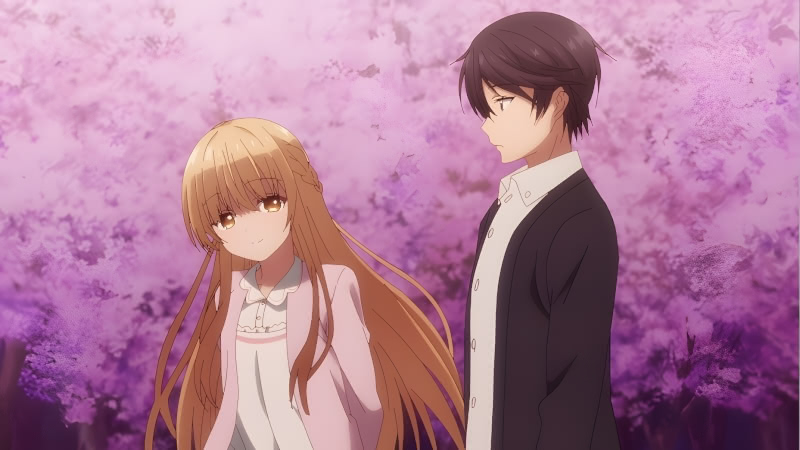
(Note: While I try to refrain from describing specific events in detail, the section in which I review the series does discuss the plot in a manner that some people who would prefer to go in blind may wish to avoid. Thus, if you are convinced that you want to watch it based only on my general overview, you may consider watching the series first and then returning to read the review section after the fact. However, in addition to refraining from specific spoilers, especially in the second half, I offer my own perspective on how best to watch and understand Angel Next Door, which some prospective viewers may find useful going into the series.)
I previously discussed The Angel Next Door Spoils Me Rotten in the context of its primary ending theme. The song rang a bell for me, and that inspired me to figure out where I had heard it before. The story, solution to the puzzle, and my poor attempt at a music review are all available in Familiar song in Angel Next Door anime.
The Angel Next Door Spoils Me Rotten Details
| Series | The Angel Next Door Spoils Me Rotten |
| JP Title | Otonari no Tenshi-sama ni Itsu no Ma ni ka Dame Ningen ni Sareteita Ken |
| References | Anime Database. Anime News Network. My Anime List. Wikipedia. |
| Aired | Jan. 7, 2023 – March 25, 2023 (12 episodes). |
| Studio | Project No.9 |
| Director | Lihua Wang |
| Source Material | Light Novel by Saekisan (anime adapts first 4 volumes) |
| U.S. License | Crunchyroll |
Crunchyroll has the North American license for The Angel Next Door Spoils Me Rotten, and it is available for streaming on the platform. I watched it on Crunchyroll, from where I also drew all of the screenshots used in this article.
Generally Spoiler-Free Introduction and Summary
Reviewing an anime series for general audiences who have not yet seen it requires a delicate balance of saying enough to provide a clear and concise idea of what the series is about (while also making the review worth reading) but not so much detail as to ruin the series for people who may be interested in watching it based on the review. Below, I try to strike that balance.
Dramatic personae
The principal protagonist and viewpoint character of The Angel Next Door Spoils Me Rotten is Amane Fujimiya. He is a high school student who lives alone in his own apartment. Amane is neither neat nor organized and buys his meals at convenience stores. He has few friends at school and prefers to remain below the radar.

The co-protagonist of the series is Mahiru Shiina. She attends the same school as Amane and is the school’s proverbial idol, being admired both for her appearance and her intelligence. She happens to live alone next door to Amane, a fact they discover in the first episode of the series. Mahiru keeps people at a distance at school while working to live up to high expectations. Unlike Amane, she is well-organized and a capable chef.
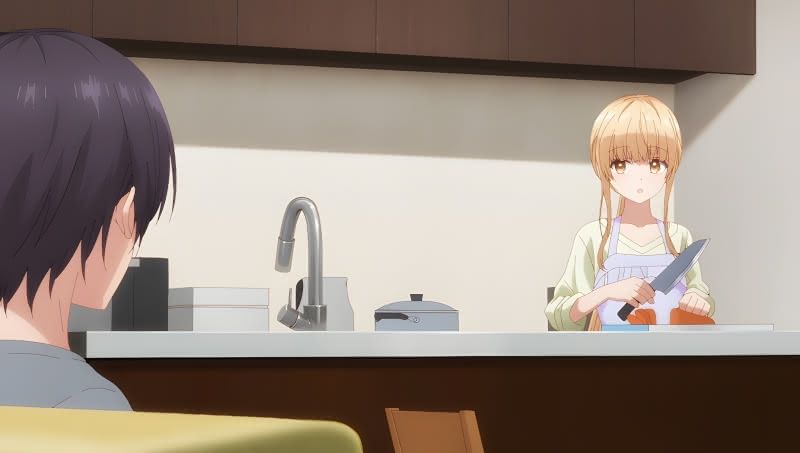
The Angel Next Door Spoils Me Rotten is principally a two-character show, with most of the scenes and dialogue focusing on the two protagonists. However, the series does introduce a small number of supporting characters. Itsuki Akasawa, a good-natured and energetic classmate of Amane and Mahiru, is Amane’s best friend in school. Itsuki’s even more energetic girlfriend, Chitose Shirakawa, is also part of their circle. Amane is later befriended by Yūta Kadowaki, who is viewed in the school as something akin to the male version of the much admired Mahiru. Finally, Amane’s parents, mainly his mother, Shihoko Fujimiya, play a role in several episodes. All of the regularly recurring side characters are initially related only to Amane, which makes sense in light of the fact that, while he and Mahiru are the co-protagonists, Amane is the viewpoint protagonist.
Plot
Amane Fujimiya is a listless high school student who lives alone. His apartment is a pigsty and he subsists on junk food and energy pouches. He is standoffish and keeps to himself, but has two close friends in Itsuki Akasawa and Itsuki’s girlfriend, Chitose Shirakawa.
One day while walking home, Amane sees his classmate, Mahiru Shiina, sitting alone on a swing in the rain while looking upset. Although Amane has never talked to Mahiru, he recognizes her because she is the most-admired girl in his school, with her classmates referring to her as an “angel.” Mahiru is not initially receptive to Amane’s matter-of-fact concern for her, but he nevertheless lends her his umbrella and runs home in the rain.
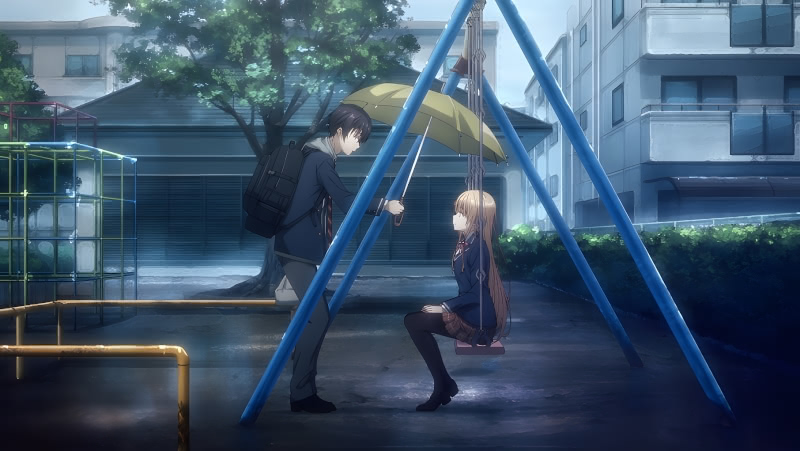
One rule of anime is that if you get wet in the rain, you become sick with a cold. However, only Amane succumbed, albeit he went to school anyway. Mahiru decided to return Amane’s umbrella and encountered him outside his apartment, gravely ill with an anime cold (very serious illness). Amane responded coldly to Mahiru (much like Mahiru initially had been to him ), but she persisted and helped him inside after he nearly collapsed from his anime cold. Mahiru was aghast when she saw the condition of Amane’s trash-strewn apartment, and she ran next door to her apartment while saying she would return. It was then Amane realized what Mahiru had apparently already figured out, that they were next-door neighbors. Mahiru made porridge for Amane, and he rather liked the porridge. This set in motion what would be a long string of events.
The next day, Mahiru learns that Amane does not eat well (she was unimpressed by his energy gel). She seesfit to bring him her leftovers, which she had cooked while insisting that she does it for her own satisfaction. Things gradually escalates. Mahiru continues bringing food, Amane begins contributing to shopping for food, and they begin eating together. Mahiru also cleans Amane’s apartment because looking at the state of things causes her pain. One point we glean early on, other than the fact that none of this is to be construed as being romantic (according to Amane and Mahiru), is that Mahiru hates being viewed as the school’s “angel.”
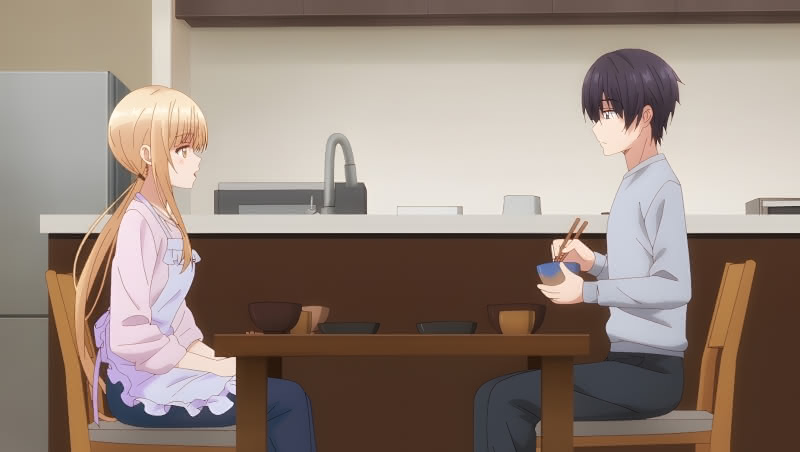
The relationship between Amane and Mahiru evolves throughout the show. Amane, confident that Mahiru has no interest in him romantically, accepts her cooking with gratitude while not being sure what motivates her. Mahiru insisted that it was for her own satisfaction, but Amane was unconvinced. Notwithstanding Mahiru shares her cooking, she is more blunt and less friendly than he is in the very early stages. Mahiru and Amane do not talk at school in an effort to keep their circumstances a secret, but their secret is discovered by a few people close to Amane within the first few episodes.
Given the set-up, the series, which takes place over a relatively short period, wastes little time in developing Amane’s and Mahiru’s relationship. While it is not averse to using tropes – we have Amane helping Mahiru home when she has a sprained ankle and Mahiru coming down with a worse case of anime cold than Amane had in the first episode – the show does demonstrate some originality and purpose in how it closes the gap between them. A kind gesture by Amane in the second episode, wherein he buys Mahiru a birthday present after discovering her birthday indirectly, helps bring them closer. Mahiru begins cooking dinner for the two of them at Amane’s place, and they are soon enough living like a married couple after school without technically being in a relationship. There is little doubt that they are each other’s closest confidants by the mid-way point of the series.
In the second half of the series, we learn the circumstances behind Amane’s and Mahiru’s living alone. In both cases, the circumstances are relevant to their relationship with one another. Amane’s circumstances, which are decidedly less severe than Mahiru’s, inform her cautious approach to everything involving Mahiru. Mahiru’s circumstances, which are not surprising to careful viewers, inform why it means a great deal to her to have someone rely on her and appreciate her as a person.
Every character who is aware of the situation involving Amane and Mahiru is convinced, not without reason, that they are effectively in a romantic relationship and in a state of denial about it. Amane, for reasons relating to his initial understanding of Mahiru’s intentions and his own complexes, adamantly denies this and denies even the possibility that Mahiru, despite her becoming progressively warmer as the series goes on, could be interested in him in that way. (Note that the only thing that annoys Mahiru as much as being referred to as “angel” is having to listen to Amane’s self-deprecating comments.) The final stages of the series put Amane’s willful blindness to the test.
Without spoiling the particulars, I note that The Angel Next Door Spoils Me Rotten ends in a decisive manner, resolving the core issues of its 12-episode run by the finale. The end is something of a beginning, but it is more than clear enough to allow Angel to stand on its 12-episode feet even if the anime does not receive a second season.
Review Preface
Having offered as detailed an explanation of the plot as I could without spoiling the particulars of key events (the overall course of events is not entirely unpredictable), I move to my subjective review of the series. My summary, and the points I chose to highlight, should give readers enough of a basis to consider my review without having seen the series. If you are reading this after having seen the series, you can appreciate some points of my review with all of their subliminal context.
I view The Angel Next Door Spoils Me Rotten as the newest in a line of anime series based on light novels with unwieldy names (is there any other kind?) that sound somewhat dumb based on their premises, but turn out to be better than expected (pun intended). 2021 saw Bottom-Tier Character Tomozaki, a series about a boy with no obvious redeeming qualities other than a gift for a game that is totally not Super Smash Brothers, and the school idol, who is secretly also very good at that game and takes an interest in convincing him to try to be good at life as well as games. On the surface, the premise sounds like a set-up for rank wish fulfillment for disheveled antisocial young men with video game addiction, but it turned out to be smarter than expected and set itself up well for an upcoming second season. 2022 saw My Stepmom’s Daughter Is My Ex, which sounds like complete trash based on the title, but turned out to be much more serious and nuanced about its set-up than one would have thought with no prior knowledge. Now, when I say “better than expected” – better is relative. I generally liked Tomozaki whereas my view on My Stepmom’s Daughter Is My Ex ranged from “bad” (much of the first half) to “solid, even compelling” (first couple of episodes and parts of its third quarter). However, neither were among my top five (2021) or top six (2022) series, both being relegated to honorable mention status.
Angel Next Door’s premise sounds like pure wish-fulfillment. On the surface, we have a nondescript, slovenly guy who, for reasons unknown, attracts the attentions of the most attractive and intelligent girl in his school. Without having done anything to improve himself or win her heart, he suddenly gains her home-cooked meals.
Now, to be sure, the wish fulfillment hook of Angel Next Door is there. But for the reasons I articulate below in my review proper, the series, while not without blemishes, is not a pure wish fulfillment fantasy for Amane. Amane, for his own shortcomings, is not an inept loser insert character, and Mahiru, granting the convenient set-up, is not lying when she says that she has something to gain from her peculiar relationship with Amane.
(Note: There is an interesting aspect wherein one could view the second half of the series as representing feminine wish fulfillment from Mahiru’s perspective – depending on the viewer’s perspective – but that meta-discussion is beyond the scope of the instant review. I addressed some tangential ideas in an article about anime romances with large height differences between the dramatic personae.)
Review of The Angel Next Door Spoils Me Rotten
The Angel Next Door Spoils Me Rotten has a single, all-consuming focus: The relationship between Amane and Mahiru. The series’ mono-focus is such that it contains no meaningful plot-lines that do not center on Amane and Mahiru. While the pair do have independent stories, all of their individual troubles are seen through the lens of how they affect their relationship . Given the set-up and Angel’s single-mindedness, whether the series succeeds or fails depends primarily on whether Amane and Mahiru are likable, whether their motivations and impulses are intelligible, and whether their relationship progression makes sense. Angel is largely successful in these three respects, which leads to it being a good series on the whole, despite its faults. Thus, I will lead with the good – the individual characterizations of Amane and Mahiru and how their relationship development was handled, including its admirably good pacing (especially by genre standards).
However, the series has flaws in the form of turning all of its small cast of supporting characters into one-dimensional plot devices. More seriously, and unfortunately in light of the often deft handling of Mahiru-Amane dialogue, Angel has a tendency toward what I call two-by-four story-telling. Whereas it largely does well at having Amane and Mahiru articulate and show their feelings in direct ways, it struggles when it needs to tell us something concrete, often hitting us with the concrete violently and repeatedly. Finally, while Amane’s character is ultimately intelligible and his actions are logical, I would have preferred the series handle his internal monologues in the late stages of the series with a bit more sophistication than it did.
Finally, I will address Angel’s aesthetics – specifically its audio-visual presentation. Its visual quality ranges from solid in its better moments to noticeably poor, but its shortcomings are mitigated by the fact that Angel Next Door is a very low-action production.
Character analysis and development
Neither Amane nor Mahiru makes the best first impression, but one of the main points of the series is that they are good influences on each other, specifically in softening their edges and working to overcome their flaws and inhibitions.
Separate from his general improvement, Amane is more than he appears at the start of the show. It is made clear, notably by Mahiru, that Amane is decently attractive when he chooses to dress up. His grades are average, but he is capable of more with a bit effort. Amane keeps people at a distance for reasons relating to his past, but he is considerate of those he cares about. It is precisely because Amane does have genuinely redeeming qualities that Angel Next Door works to the extent that it does. Were Amane the sort of bland, unpleasant insert character that often dominates the genre, Mahiru’s growing feelings for him would have been thematically incomprehensible.
Amane’s character flaws – his low self-evaluation, standoffishness, and tendency to distance himself from others by being excessively blunt – have roots in his past experiences. It is not difficult to guess the parameters of Amane’s problem before he confides it early in the second half of the series – especially in light of the fact that he is shown to have a good relationship with his parents, thus ruling that out as the cause of why he lives alone. The series requires the viewer to understand Amane’s inhibitions because those inhibitions are central to how he approaches his relationship with Mahiru. An improper understanding of Amane would lead the viewer to incorrectly conclude that, in the later stages of the anime, he is unimaginably dense. (Amane ultimately disabuses viewers of that notion in a clear and concise way.)
In contrast to Amane, Mahiru appears to be perfect. She is recognized as being beautiful. Moreover, she is athletic and achieves the best test scores in her class. That her classmates refer to her as an “angel” is a form of idolization. While most of her classmates are enamored with her, there is little evidence that Mahiru has any close friends prior to spending time with Amane.
Through her interactions with Amane, we see a different side of Mahiru. When she is not playing her public part, her matter of speaking is sometimes more blunt than Amane’s, and she similarly lacks a good brain-and-mouth filter . While she plays the part of “angel” at school, we learn that she hates being seen as an angel and wishes, despite herself, that she could just be herself. The reason why Mahiru wears her public mask is tied to the circumstances that have her living alone, which are decidedly darker than Amane’s circumstances (although do not try to tell that to Mahiru).
(I will note, however, that Mahiru’s “mask” (so to speak) is more that she tries to keep everyone at a distance in school while being the person people expect her to be rather than constructing an alternate personality. She is more akin to Hayato Hayama from My Teen Romantic Comedy SNAFU than to Yukino Miyazawa from His and Her Circumstances.)
Mahiru does not have an unequivocally positive view of Amane in their first meetings. Thus, while there are explanations for why she initially shares her cooking with him and takes it upon herself to clean his apartment (the state of it caused her pain), a certain leap of faith is required to accept everything. Angel Next Door relies on several convenient plot points to get things going.

Fortunately, Mahiru’s character makes good use of the the helpful set-up once everything settles down beginning in the second episode. It becomes clear that Mahiru appreciated Amane’s small act of kindness toward her – stopping to see if she was in trouble and lending her his umbrella – despite his not being obviously enamored with her or seeming to want anything in return. She also appreciated the fact that Amane acted like a normal person toward her in contrast to her classmates. Amane inadvertently sealed the deal by responding with genuine gratitude when she shared her leftovers with him, without realizing that Mahiru simply liked the idea of having someone rely on her and appreciate her as a person. From there, their friendship grows as they spend time together and gradually open up to one another.
One of the strongest points of Amane’s and Mahiru’s relationship, separate to some extent from its early romantic subtext, is how they improve each other. Mahiru implores Amane, with some success over time, to improve his opinion of himself. This impulse derives from Mahiru’s high opinion of Amane, which is the result of their interactions over time. While Amane is slow to recover from his doldrums, he gradually takes better care of himself and improves the distancing aspects of his manner as the show proceeds. Likewise, through playing house with Amane, Mahiru for the first time makes a connection with someone with whom she feels like she can let her guard down and be herself. It is on account of their particular flaws that it is Mahiru, the girl who appears to have everything, who makes friends through Amane, the boy who began the series with just two friends, and not the other way around. Amane’s being himself, from happily enjoying her food and complementing her to showing an interest in getting to know her as a person, means more to Mahiru than Amane understands for much of the series. Because of her friendship with Amane, Mahiru begins to rethink her cool-but-distant public persona.
Amane and Mahiru develop a rapport while never abandoning the central tenants of their personalities. Both have a blunt way of speaking – they are even blunt and to-the-point when they are being affectionate. Early on, this comes across with Mahiru stating what she thinks about Amane’s irresponsible home lifestyle, and Amane telling Mahiru what he thinks about her level of charm. Later, this tendency leads them to sometimes blurt out affectionate sentiments before they realize that they find what they said embarrassing.
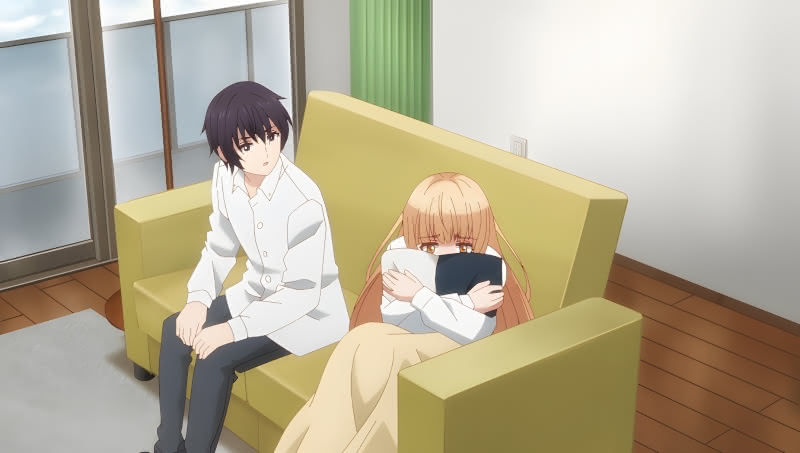
While always being themselves, Amane and Mahiru show good range as they deal with lighthearted matters, flirtatious matters, and serious matters about their pasts and inhibitions. Although they are not the most natural pair one could draw up, the series does an effective job of showing how each was the person that the other needed at a particular point in their lives.
In understanding The Angel Next Door Spoils Me Rotten, it is important to watch with the understanding that, while Amane and Mahiru are co-main characters, we see all of the events from Amane’s perspective. We have access to Amane’s vision, monologues, and all of the times that his friends or parents tell him that he is effectively already married to Mahiru. While Mahiru has nearly equal screen time (which goes to show the series’ singular focus on the pair), we only see her as Amane sees her. The perspective issue is interesting when we consider how Amane and Mahiru progress from neighbors with a strange relationship to friends to best friends to everyone who knows about them conclude that they are dating. Amane’s general social skills are poor, but he has a good set of traits for cultivating the sort of intense friendship that he builds with Mahiru. However, while Amane is smarter than he is often willing to admit in his monologues, he is not perfect – there are subtleties about Mahiru that he misses in the first instance but that should be intelligible to careful viewers. Understanding the clues Mahiru drops is crucial to understanding why she quickly warms up to Amane and eventually develops stronger feelings for him.
Later in the series, we encounter another challenge with Amane the narrator: He is not always a reliable narrator about his own feelings. As I noted, Mahiru’s behavior changes over time in ways that one would have to be remarkably dense to miss. For reasons that are consistent with his characterization, Amane does a good job of playing dense when he wants to. This denseness does not only extend to his outward interactions, but also his monologues. If the viewer were to conclude that Amane is actually being that dense, the series collapses on itself, manufacturing drama through one of its main characters developing a sudden and acute case of idiotitis. However, the truth, which is eventually made explicit, is that Amane does in fact see all of the things that the viewer sees. It was not that he was dense, but that there were certain things that, for reasons he articulates, he refused to even articulate to himself. While there are some points to fault in the presentation (I will reach those faults a bit further down), the presentation is coherent.
Although Angel Next Door is heavily invested in its “will they or won’t they?” plot, which is more of a foregone conclusion than it is in some more dramatic anime romances, one’s appreciation of the series requires appreciating the effect that Amane’s and Mahiru’s friendship has on the two leads. While side characters note the obvious in the first half of the series, neither Amane nor Mahiru begins the series in a place where they could be in a relationship. It is precisely because of the positive influence that they have on each other that there can be a romance story between them. None of this praise is to say that Angel Next Door, while being surprisingly well paced, does not drag the will they or won’t they plot out a bit in the last few episodes, but it makes a largely successful effort to find meaning for both Amane and Mahiru in the journey from point A to point B. Their mutual search for meaning distinguishes it from series where the will they or won’t they plot exists solely to test viewers’ patience. This, in conjunction with the fact that it does not lean on misunderstandings, is ultimately Angel Next Door’s redeeming quality.
(Because I have discussed Kimi ni Todoke here at The New Leaf Journal, I will compare Angel Next Door favorably in one respect – this is not to say Angel Next Door is the better series overall, however. Kimi ni Todoke’s second season is, at times, an exercise in frustration, undoing some of the work done in the first season by leaning heavily on misunderstandings to extend its will they or won’t they plot. In this area, Angel Next Door makes a more honest effort to find meaning in the journey, separate from whether all viewers will agree with its choices.)
Notable flaws
The characterization of Amane and Mahiru, their specific issues, and how they help each other grow as they become closer are the strong points of The Angel Spoils Me Rotten. The central relationship is of high quality and better than most, and both Amane and Mahiru are memorable. But I spoiled from the outset that I found Angel as being above average, but well short of great.
Supporting characters as plot devices
Angel does not give many characters names or speaking roles. To the best of my initial recollection, only four characters besides Amane and Mahiru – Amane’s friends Itsuki and Chitose, Amane’s mother, and an additional classmate named Yuta Kadowaki – are given meaningful dialogue in more than a single episode. Nearly everything that even these characters do involves (1) encouraging Amane individually by teasing him in a friendly way about how close he is with Mahiru and how he should stop pretending they do not have feelings for each other; or (2) teasing Amane and Mahiru when they are together to try to make them stop pretending that they are just friends.
Nevertheless, the supporting characters do serve a purpose. Amane, who lacks confidence in himself, is generally scared of letting people close to him, and is especially scared of pushing away the person closest to him (Mahiru reaches that status within the series’ first half). So, constantly being called out on the fact that he has feelings for Mahiru and having it put clearly to him that Mahiru obviously holds him dear (not that she is reluctant to say that herself) does help push the plot forward. Moreover, that Amane’s two closest friends other than Mahiru, Itsuki and Chitose, are themselves in a relationship, is used at points to drop strong hints for Amane and Mahiru. But using supporting characters in such a limited way comes at a cost.

I am comfortable discussing one specific plot event with Itsuki precisely because nothing actually having to do with Itsuki himself is important to the main point of the series. All we know about Itsuki, despite him appearing in every episode, is that he gets along well with Amane, loves his girlfriend, Chitose, and soon believes very strongly that Amane and Mahiru should be dating (after he learns about their relationship early in the series). In one episode, Itsuki asks Amane if he can stay over for a few nights after having a fight with his father – who apparently does not approve of his relationship with Chitose. You may think we are going to have a heart-to-heart wherein we learn about Itsuki’s struggle, but instead Itsuki uses the sleepover to advance Amane’s relationship with Mahiru. Moreover, the effort is coordinated because Chitose decides to sleep over with Mahiru and attempts the same thing. Later, we learn that Chitose was a very good track athlete in middle school but quit due to social circumstances. But again, it is thrown out there as an aside before Itsuki and Chitose get back to work trying to make Amane and Mahiru a couple.
(Itsuki, and later Yuta, play the primary role in pushing Amane forward. I came away with the strong impression, however, that the character who had the most significant effect on advancing Amane’s and Mahiru’s relationship was Chitose. The series drops a number of hints that Chitose and Mahiru become closer friends than Amane knows, and that some changes in Mahiru’s behavior in the later stages of the series can be attributed to Chitose’s influence. However, since we only see events from Amane’s perspective, anime viewers have to rely on the trail of clues regarding Chitose’s effect on Mahiru.)
Two-by-four story-telling
Angel is at its best portraying the calm, often endearing evening conversations of Amane and Mahiru. These are often simultaneously charming and well-written, laden with clever subtlety but largely avoiding being too clever by a half (Angel admirably avoids going too far out of its depth, the limits of which are clear from some of its flaws). But when the series wants to tell you something concrete – it bludgeons you with the concrete. I call this tendency two-by-four storytelling, as in a two-by-four upside the viewer’s head.
There are many examples of Angel’s unfortunate two-by-four delivery sensibilities. That Mahiru is viewed as an angel at school is obviously a key point of the series – enough that it made it into the excessively long title. But do we need to be told this repeatedly in every episode in the first half of the series? I think not. One reason that the series belabors the point, separate from shaky writing, is likely that very little of Angel takes place in Amane’s and Mahiru’s school. Thus, lacking many opportunities to show how Mahiru is viewed, the series decided to employ brute force in telling the viewer over and over again. Thankfully, they did cool it on the “angel” angle in the second half of the series.
A more serious example of over kill comes in the brief discussions between Amane and Mahiru about their pasts. Mahiru’s situation has to do with her estrangement from her parents (not much of a spoiler, the fact she goes silent whenever the subject comes up shows itself very early in the series). My critique here separates the cause from the effects. The effects of Mahiru’s feeling unwanted by her family are portrayed very coherently and effectively with respect to her character development and relationship with Amane. However, the manner in which the series shows the cause (For those of you who know Toradora!: The Mahiru-Taiga parallels are strong, but ratchet Taiga’s parent issues to 11) left me with a concussion. I have a similar complaint regarding Amane’s past trauma, which was decidedly milder than Mahiru’s (although do not let Mahiru hear us say that). We again have the cause and effect distinction. Amane’s inability to open up, trust others, or put himself out there are intelligible. However, the reason behind it is described inelegantly (a bit too two-by-four, but not as bad as in Mahiru’s case) and almost as an afterthought despite its occurring in a pivotal scene. The cursory explanation of Amane’s trauma hinders the series a bit in that understanding it is relevant to understanding Amane’s behavior regarding Mahiru in its final quarter.
A comparatively minor complaint concerns Angel’s tendency in its first half – which is its weaker half – to rely on tropes and conveniences to push Mahiru and Amane forward. This is unfortunate to the extent that the second half of the series, in which there is more meaningful character development than in the first, mostly advances the plot organically, save for some assists in the form of moral support from the plot device supporting characters. The conveniences of the initial set-up in episode one are forgivable since we develop them quickly and there is a separate basis for Mahiru’s actions, but the series of contrivances in the next few episodes is a bit rough. Mahiru sprains her ankle and needs to be carried home; Amane’s mother visits just when they can use a kick, and Itsuki and Chitose stumble upon Mahiru while visiting Amane by happenstance in a manner similar to how Amane’s mother had done the same not long before.
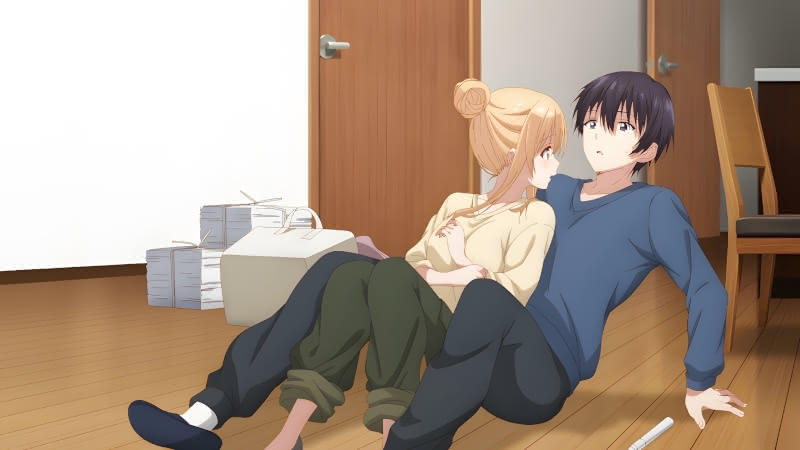
All of these required a string of events to occur, and all were used to push the plot. This resulted in first-half plot development feeling a bit forced. As I noted above, the situation improves markedly in the second half, but the series uses more of these types of conveniences than would be necessary in a series with stronger writing and direction.
Technical issues involving Amane
Amane’s early internal monologues have a tendency to be a bit repetitive. Beyond his falling back on “angel” in his head even after he has generally been trained to not say it out loud, Amane spins his wheels a bit in the first few episodes with respect to Mahiru, offering many variations of the confused “why is she doing this all for me and saying I am doing her a favor?” Now, at this stage of the series, Amane has every right to be confused, but he articulates his obvious confusion to the viewer a bit too often.
My final plot and writing complaint of the review concerns a point I praised earlier. Amane is largely in denial for much of the show. He is always denying something with respect to his relationship with Mahiru. There is a point in the final stages of the series when his denial of reality moves from his monologues to his conversations with Mahiru herself. As I noted before, the only two ways to read Amane are either that he is among the densest anime protagonists (worse than the notoriously dense Nishikata of my 2022 anime series of the year, Teasing Master Takagi-san) or that there is a reason why he is behaving in the way he does. The series made the choice to make Amane’s internal monologues largely match his outward behavior. Now, I understand the choice and, as I articulated in my analysis of his character, the choice is intelligible. Moreover, Amane does, eventually, articulate his thoughts over these episodes in a clear way. But the series would have benefited from giving Amane’s monologues in these episodes more nuance and depth, even while stopping short of having him spell out exactly what he is doing in a “tell, don’t show” manner. For example, Amane could have made things clearer for a general audience, and made the depiction of his aversion from the truth stronger, by having him tie his thoughts and behavior directly to his fear of making a mistake or losing Mahiru. It is possible the series made a few sub-optimal choices as a result of its decision to brush over the past events that caused Amane to develop his social inhibitions.
Reviewing this as an anime rather than a book
I have noted before that I tend to focus on anime series as stories first and foremost. However, anime is necessarily animated, an audio-visual affair. Thus, I would be loath to review any anime series as if it were a book without addressing some of the things that make it an animated production.
Unsurprisingly given its content, The Angel Next Door Spoils Me Rotten is not a highly animated affair. I can say with some confidence that the most-used scene in the series features Amane and Mahiru sitting on a small couch in Amane’s apartment, usually with Mahiru clutching a small black and white pillow.
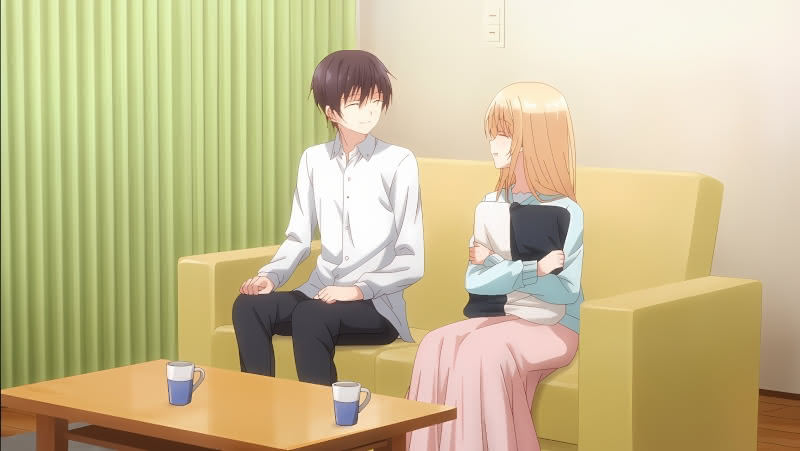
(I noticed Crunchyroll comments comparing the couch to the omnipresent bench in the amusing (and endearingly stupid) Ore wo Suki na no wa Omae Dakeka yo anime series, which aired in 2019 and which I discussed in an article about benches.)
The animation quality was variable. The first episode was well done for what the genre is, but there are noticeable dips in animation quality throughout the series which were enough for me to notice despite not being the most strident animation critic. For example, there were several scenes where Amane and Mahiru were supposed to be looking at each other while talking, but their eyes appeared to me to be staring off somewhere in the distance. Other scenes, again featuring the two of them, but while they were standing, had some occasional depth perception issues. Character models were also inconsistent at times.
With the animation faults noted, Angel Next Door is adequate in the animation area in light of the fact that the series mostly consists of dialogue. Moreover, it did leverage its likely limited budget for higher quality efforts in key moments, namely episodes 1 (specifically Amane’s finding Mahiru alone in the rain), 5, 9, and the decisive final episode.
Mahiru has the most distinct character design in the series, and she is set apart from every other character by her hair color (one of my favorite topics, but sadly no one comments on Mahiru’s hair color) and the attention to her soft facial features. The series does convey in a visual way that Mahiru is very pretty. However, I came away thinking that the series made Mahiru too visually distinct from the non-angels of the cast (note that her appearance is true to her appearance in the novels, so this is not an anime-specific critique), another example of Angel Next Door’s unfortunate tendency toward making concrete points with brute force.
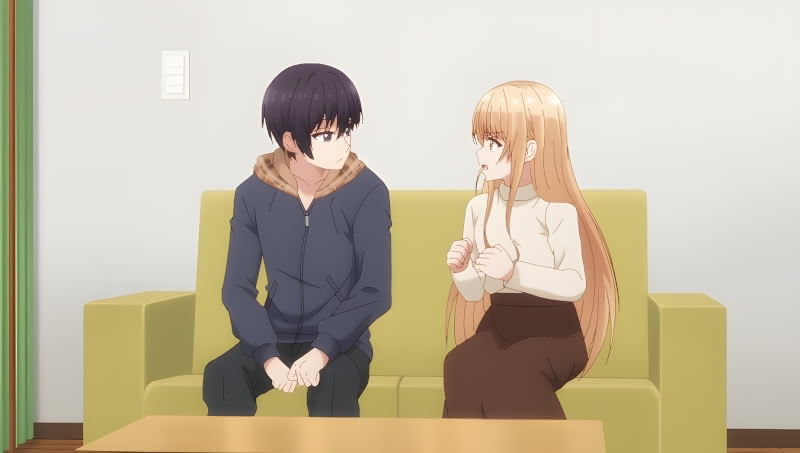
The series did a solid job of physically showing Mahiru’s emotions. No character in the series short of Chitose wears her emotions more on her sleeve than does Mahiru when she is not in her angel mask at school. When Mahiru is alone with Amane, her range is depicted very well (animation blemishes aside) – everything from sternness to manic blushing and mischievousness.
While Amane is comparatively normal in that nothing about his ordinary appearance makes him stand out, the series effectively portrays a key point about him toward the middle. Amane puts little effort into his appearance in his ordinary life. He dresses normally, and his hair, by default, is a bit of a mess. However, there are a couple of occasions, unsurprisingly inspired by Mahiru, where Amane cleans up his act – meaning he combs his hair so that it does not obscure his face and he dresses well. Amane does look noticeably better when he does this, comparable to the two students in the series who were are told are attractive. This does not go without Mahiru’s notice, and it is mentioned by other characters as well.
I also credit Angel for giving both Mahiru and Amane, not to mention Itsuki and Chitose, a large number of outfits. Few things in anime irritate me more than characters who are not in a uniform wearing the same thing over and over. I genuinely downgraded 2011’s Steins;Gate anime for this. Most of Angel takes place outside of school (specifically in Amane’s apartment), and Mahiru and Amane clearly have full wardrobes. What they wear is sometimes a focus, for example on their non-date-dates in several episodes in the middle of the series. Count Angel as an upper-echelon example of the point that 2D anime people can have more than one outfit.
Both Amane (Taito Ban) and Mahiru (Manaka Iwami) have strong voice acting performances. The lead characters have distinct ways of speaking – while by no means monotones, they almost never raise their voices and are not prone to big inflections. However, over time, Amane and Mahiru show emotional range in their speech without ever being exaggerated. The voice actors strike a good balance in keeping the characters within their distinct vocal ranges but doing so without being dull or failing to deliver in the series key emotional moments. This is especially important in Amane’s case (Mahiru has a bit more range in how she speaks) in that his ability to say important things clearly and with conviction is one of his character’s better qualities, and one Mahiru reasonably finds impressive, if not embarrassing on certain occasions.
The in-show soundtrack played a background role and did not leave a major impression on me, but it complemented the series’ aesthetic well and never grated or got in the way. I noted in a previous post that I did very much like Angel’s main ending song, which was performed by Mahiru’s voice actress, Ms. Manaka Iwami. Its second ending, which it uses less frequently, Ai Uta, is also performed by Ms. Iwami and quite pleasant. The opening song has more animation than the ending songs, but my opinion on it is neutral.
Strong and weak episodes
I wrote my article on Angel’s first ending song after having watched the first five of twelve episodes. In order to introduce the series behind the song, I offered my brief impression of the series thus far:
No one would accuse Angel Next Door of having a particularly novel set-up, and it is generally true to form. It is the kind of average series that I can tolerate and appreciate if it delivers some good character writing while avoiding devolving into pure wish-fulfillment. Thus far, it has had some good moments and laid the groundwork for some potentially interesting events in its second half. The main characters are well-written enough, but its good moments are off-set by occasional bouts of eye-roll inducing dialogue and the series’ determination to bludgeon us with the fact that everyone in the school admires Mahiru (we get it). My early impression is “adequate, but the jury is still out on the final verdict.
N.A. Ferrell (see article)
That paragraph, with the additional commentary herein, effectively summarizes my view of much of the first half of Angel. Fortunately, as I suggested above, the series meaningfully improves in its second half. Having mostly gotten bludgeoning us with Mahiru’s reputation out of its system, Angel’s second half deliberately, but effectively, develops the relationship between Amane and Mahiru through several stages. It is clear to everyone but Amane and Mahiru what is happening by the half-way point, and I dare say it may well be clear to Amane and/or Mahiru by that point as well. But the series continues to close the gap between them, allowing them to confide in each other before they have to honestly consider what they mean to one another and whether the status quo is sustainable. Angel solidifies its overall good valuation by saving its best for its final few episodes, and its very best for the last episode, which ends the series on a strong note.
Conclusion and Final Analysis
I did not know what to expect in terms of quality from The Angel Next Door Spoils Me Rotten going in, but it turned out to be a solid piece with a surprisingly good and effective conclusion. It fits in well with the sequence of three high school series – 2021’s Bottom-Tier Character Tomozaki and 2022’s My Stepmom’s Daughter Is My Ex – that are better than their obnoxious titles would have suggested. With its conclusion, Angel is the best of the three, narrowly edging out Tomozaki.
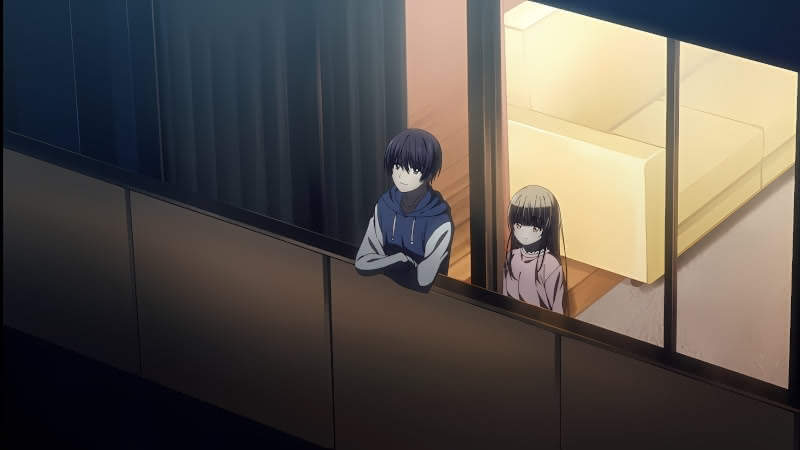
However, despite my (excessively) lengthy review and analysis, Angel Next Door tops out as a good, but not great, series. Its central relationship was compelling and it developed Amane and Mahiru in a way that made the ending both well-deserved and rewarding for viewers who followed the series. It did not have the writing and story-telling chops to deliver the story without some contrivances, especially in the first half, and it was unsure of itself when going into Amane’s and Mahiru’s pasts, which were significant to understanding their behavior. On the balance, Angel is solidly above average for the genre, but well below the best (e.g., my runner-up best anime series of the 2011-2020 decade, My Teen Romantic Comedy SNAFU!).
I produced year-end anime reviews with rankings in 2021 (top five) and 2022 (top six). Had it aired in those years, Angel would have made the latter-half of the 2022’s top six, but not 2021’s. I will tab it as an early borderline top-six candidate for 2023, working under the assumption that 2023 sees the expected number of strong series for a year. However, its excellent final episode stands as an early candidate to earn an honorable mention from me for best individual episode of 2023.
I conclude by noting that there are apparently eight volumes of the underlying novel series, with more to be published in the future, and the anime only adapted the first four. While I have not read the novels, and thus have no informed view about what happens beyond volume four or whether it is good, I would certainly be interested in seeing another season on Angel Next Door (I believe there will be a second season) focusing on new aspects of Amane’s and Mahiru’s relationship (I hope with a bigger budget for more consistent production values). However, unlike many series that end in medias res, Angel has a clear beginning and end, and its end justifies the investment viewers put into watching Amane and Mahiru grow closer.
Angel Next Door is streaming on Crunchyroll. It is certainly not for everyone, but it comes with my qualified recommendation if you found the series somewhat interesting from the details in my review. (See Crunchyroll post with notes from the writer of the underlying novel and extra visuals after the final episode aired.)